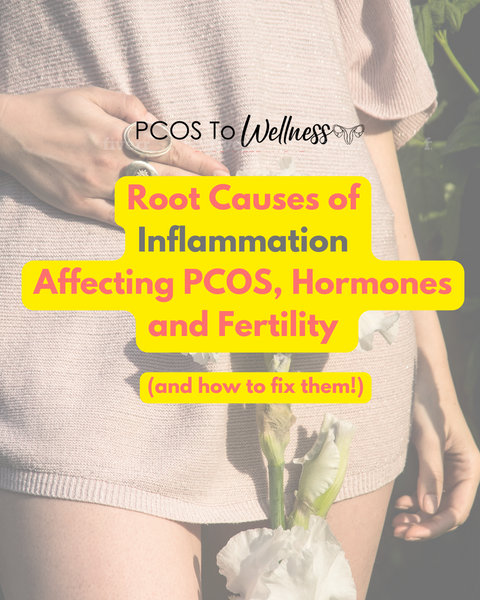Root Causes of Inflammation Affecting PCOS, Hormones and Fertility (and how to fix them!)

If you are trying to get pregnant, have PCOS or want to balance your hormones you NEED to address inflammation first.
Chronic inflammation can disrupt fertility, worsen PCOS symptoms, and throw hormones off balance. Identifying your triggers is the key- but unfortunately for some (including myself) it be harder than you think!
SO here’s a list of some of the BIGGEST culprits of inflammation that can quite often go unsuspected:
- Lack of Exercise
- Imbalanced Microbiome
- Nutrient Deficiencies
- Processed Foods
- Chronic Viral Infections
- Stress
- Environmental Toxins
- Mold
- Unresolved Trauma
- Insulin Resistance
- Dehydration
- Some medications
- Not enough sleep
- Alcohol
- Food Sensitivities
- Gut Infections
- Sugar
- Negative Thoughts
- Heavy Metals
Theres A LOT right?
But don't worry, every single on of these can addressed.
Some can be addresses TODAY, and others might take a bit longer- but trust me its WORTH IT.
Here is a list of common sneaky causes of inflammation and how to address them in order to help boost your fertility, reduce PCOS symptoms, and overall balance hormones:
1. Processed Foods: Reduce the consumption of processed foods, which often contain additives, preservatives, and unhealthy fats. Opt for whole, unprocessed and organic foods where possible instead.
2. Lack of Exercise: Incorporate regular physical activity into your routine to reduce inflammation and improve hormonal balance. Aim for at least 30 minutes of moderate exercise most days of the week. Low impact exercises such a walking, yoga, pilates can be great options for reducing inflammation.
3. Imbalanced Microbiome: Support a healthy gut microbiome by consuming probiotic-rich foods like yoghurt, kefir, and fermented vegetables. Consider a high quality pre and probiotic supplement if necessary.
4. Nutrient Deficiencies: Ensure you're getting all the necessary nutrients, you may wish to be testes to find out if you have any deficiencies to enable a more targeted approach with supplementation. Ideally we want to be getting most of our nutrients from our diet, include a variety of fruits, vegetables, whole grains, lean proteins, and healthy fats.
5. Chronic Viral Infections: Seek medical advice to address chronic viral infections, as they can contribute to inflammation and hormonal imbalances. Follow appropriate treatment and management plans.
6. Stress: Stress is a big sneaky cause of inflammation. Managing stress through techniques like meditation, deep breathing, or engaging in activities you enjoy. Chronic stress can disrupt hormone balance and contribute to inflammation.
7. Environmental Toxins: Minimise exposure to environmental toxins by using natural cleaning products, avoiding plastic containers, switching to non toxic skin and hair products and choosing organic produce when possible.
8. Mould: Address any potential mould issues in your home, as exposure to mould can contribute to inflammation and hormonal imbalances. Seek professional help if needed.
9. Unresolved Trauma: Another cause of inflammation that is often missed. Prioritise emotional well-being and seek therapy or counselling if needed to address unresolved trauma, as emotional stress can greatly impact hormone balance.
10. Insulin Resistance: Support blood sugar regulation and insulin sensitivity through a balanced diet. Include whole grains, lean proteins, healthy fats, and regular meals/snacks throughout the day. Minimise refined carbohydrates and sugary foods.
11. Dehydration: Stay hydrated by drinking plenty of water throughout the day. Dehydration can affect hormone balance and overall health.
12. Some Medications: Discuss potential alternatives or additional strategies with your healthcare provider if you're taking medications that may contribute to inflammation or hormonal imbalances.
13. Not Enough Sleep: Prioritise sufficient sleep to support hormone balance and overall health. Aim for 7-9 hours of quality sleep each night.
14. Alcohol: Limit alcohol consumption, as excessive intake can disrupt hormone balance and contribute to inflammation. Opt for moderation or consider removing all together
15. Food Sensitivities: Identify and address food sensitivities by working with a healthcare professional or registered dietitian. They can help you identify trigger foods and create a personalised elimination diet or meal plan.
16. Gut Infections: Address gut infections such as SIBO (small intestinal bacterial overgrowth) or Candida overgrowth by working with a healthcare professional. They can recommend appropriate treatment options and dietary changes.
17. Sugar: Reduce your intake of added sugars and sugary foods, as they can contribute to inflammation and hormonal imbalances. Opt for natural sweeteners like stevia or choose whole fruits instead.
18. Negative Thoughts: Practice positive thinking and mindfulness techniques to reduce negative thoughts and stress. Engage in activities that bring you joy and surround yourself with supportive and uplifting people.
19. Heavy Metals: Minimise exposure to heavy metals by avoiding contaminated water sources, limiting consumption of certain fish known to be high in mercury, and considering metal detoxification protocols under professional guidance if needed.
Additionally: Consider including specific herbs and adaptogens in your diet or supplements that can help actively reduce inflammation and balance hormones. Our high potency organic tea blends, 'Cysterhood,' 'Chaihood,' and 'Zenhood,' have all been specifically designed to help with reducing inflammation and balancing hormones. These blends contain herbs and adaptogens known for their anti-inflammatory, fertility boosting and hormone-balancing properties, providing a delicious and natural way to support your wellness journey. (And they have helped thousands of women from around the world just like you!- you can read their real reviews here)
Please remember, it's important to consult with a healthcare professional who specialises in fertility, PCOS, and hormone balance for personalised advice and guidance.










